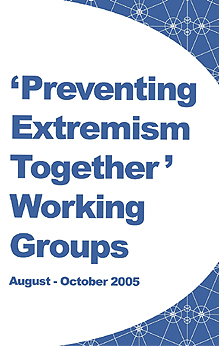
Genre: Government & Politics
Publisher: The Home Office
Release Date: October 2005
Pages: 102
In August 2005, the Home Office invited about 90 Muslims to participate in a working group ‘Working together to prevent extremism’. Seven task groups were set up: Education (chaired by Yusuf Islam); Engaging with Muslim women (Baroness Pola Manzila Uddin); Imams training and accreditation and the role of mosques as a resource for the whole community (Lord Nazir Ahmed); Regional and local initiatives and community actions (Nahid Malik); Community security – including addressing Islamophobia, increasing confidence in policing and lacking extremism (Muhammad Abdul Aziz); Tackling extremism and radicalisation (Inayat Bunglawala). The participants represented an informed and varied cross-section of the community with experience in community work, Labour Party political activity, the business sector, race and religious discrimination legislation, research and the media. There was a sprinkling of celebrities, some intellectual heavyweights and one or two non-Muslims well-known in interfaith dialogue circles. There was an element of oversight from Home Office civil servants observing and offering occasional advice.
The groups, varying in size from a dozen to over twenty, held a number of meetings including a week-end retreat (10-11th September) at Windsor . A draft report was presented to the Home Secretary on 22nd September and the final report, containing the task groups’ eminently sensible 40 recommendations were published on the Home Office’s website in November 2005. The Home Office has since announced its interest in pursuing three of these recommendations: a ‘road show’ idea – the establishment of an ‘Islamic way of life’ exhibition to tour schools to help increase understanding about Islam and “what Muslims actually believe and stand for”; the establishment of a national forum to tackle Islamophobia and extremism – it will “provide a forum for a diverse range of members of the British Muslim community to come together and discuss issues relating to tackling Islamophobia and harmful forms of extremism”; and finally and controversially, the establishment of a “new national advisory body/council of mosques and imams. This body would be inclusive and representative of the many traditions practiced in the UK, independent and lead by the instutions it serves”.
The Government’s intention to foster the advisory body of mosques and imams is likely to be seen as state interference in places of worship, unless it is genuinely independent of government and self-regulating. However the devil will be in the detail, and many imams are reserving comment until this is available.
The Government decided not to accept a recommendation most important to many of the Muslim participants: the need to establish and undertake a public inquiry (or a judicial inquiry) into the ‘what, how and why’ of the July bombings, including an enquiry into the root causes of, and the Government’s and other public agencies response to, the atrocities”. Presumably this was torpedoed because it would open up an investigation into foreign policy decisions that took the country into the Iraq misadventure. This rejection is a disservice to the nation, because a significant factor in tipping troubled young men into violent extremism have been the graphic images from that war and the resulting sense of injustice and hopelessness. The Home Office task groups provided Muslims in Britain with an opportunity to engage with Government. The participants should be commended for their sense of public duty and responding to the challenge with creative hard work. This report should not be allowed to gather dust on some Whitehall shelf. Its more credible suggestions could form a basis for many useful projects carried out by community organizations themselves.
